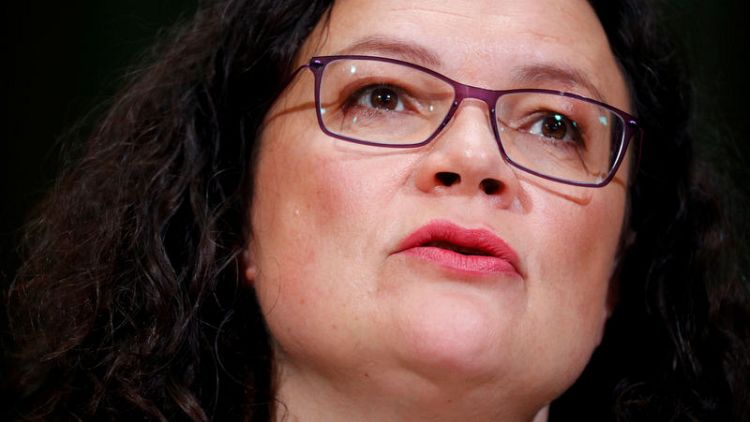By Joseph Nasr and Holger Hansen
BERLIN (Reuters) - Germany's centre-left Social Democrats (SPD) unveiled a position paper on Sunday that calls for more generous state allowances for the unemployed, children and pensioners, seeking to appeal to working class voters in four regional elections this year.
The SPD, junior coalition partners of Chancellor Angela Merkel's conservatives, have been debating how to regain the confidence of voters who handed them their worst results since 1949 in a 2017 national election.
Even though Merkel's conservatives are likely to oppose most of the proposals approved by SPD leaders at a meeting in Berlin, there is little risk the blueprint will ignite a crisis in the government.
The proposals are designed to unite the SPD before a regional election in May in the northern city-state of Bremen, where the party has ruled since 1946 and where a loss to the conservatives would seriously hurt its chances of revival at the national level. Opinion polls currently show the SPD one percentage point behind the conservatives in Bremen.
Unveiling the plans, SPD leader Andrea Nahles was careful not to present them as policy demands from the conservatives, who are not as keen on raising state allowances as their centre-left coalition partners.
"This is not our aim," Nahles said when asked how many concessions she expects to get from Merkel's Christian Democrats (CDU) and their Bavaria-based Christian Social Union (CSU) sister party.
"This is about a position paper of the SPD ... and this means we will campaign based on this concept with the goal of convincing people," she added. "But I am curious to know how the conservatives react to it."
The proposals call for extending the period people may claim unemployment benefits, especially those who lose their jobs in their 50s, and increasing unemployment benefits for parents. They also include raising the minimum wage from just over 9 euros an hour currently to 12 euros.
Both the SPD and conservatives were punished in the 2017 election by voters angry at Merkel's decision two years earlier to welcome almost a million asylum seekers, mainly Muslims from Syria, Afghanistan and Iraq.
THREAT FROM FAR-RIGHT
Both parties have been trying to reinvent themselves to win over voters who backed the Alternative for Germany (AfD) far-right party, which in 2017 entered the national parliament for the first time as the third-largest force.
Merkel's CDU was holding a separate meeting on Sunday and Monday in Berlin, and politicians and experts were expected to debate how integration and immigration policies can be improved.
The SPD's new policies are the boldest attempt yet to undo some of the "Agenda 2010" reforms enacted by their own party under then Chancellor Gerhard Schroeder over a decade ago.
Those reforms included big cuts to unemployment benefits and gave the Labour Agency powers to force the unemployed to take up low-paid jobs regardless of their qualifications.
The SPD paid a heavy political price, losing a significant section of its working class support base and four successive elections to the conservatives starting in 2005.
The party hopes the new proposals will not only bring back voters but also heal a rift between its leaders and the youth wing, which after the 2017 election had opposed joining Merkel in a third coalition in 12 years.
"Today is a day of the liberation in the recent history of the SPD," SPD youth wing chief Kevin Kuehnert told the Rheinische Post newspaper. "This new concept puts an end to a long period of uncertainty and volatility."
In national opinion polls, the SPD, which won just over 20 percent of the vote in 2017, has 17 percent support, behind Merkel's conservatives who are on 30 percent.
In addition to the Bremen election, regional votes are being held this year in the three eastern states of Brandenburg, Thuringia and Saxony. In those three states polls indicate the far-right AfD will emerge as the second-largest political force after the conservatives.
(Additional reporting by Reinhard Becker; Editing by Frances Kerry)
